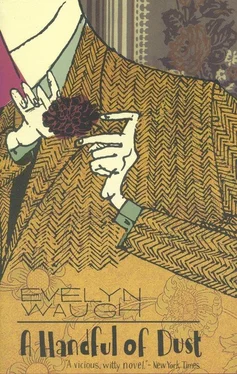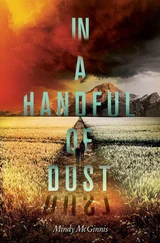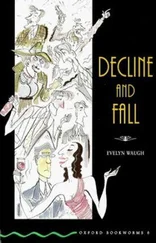Evelyn Waugh - A Handful Of Dust
Здесь есть возможность читать онлайн «Evelyn Waugh - A Handful Of Dust» весь текст электронной книги совершенно бесплатно (целиком полную версию без сокращений). В некоторых случаях можно слушать аудио, скачать через торрент в формате fb2 и присутствует краткое содержание. Жанр: Классическая проза, на английском языке. Описание произведения, (предисловие) а так же отзывы посетителей доступны на портале библиотеки ЛибКат.
- Название:A Handful Of Dust
- Автор:
- Жанр:
- Год:неизвестен
- ISBN:нет данных
- Рейтинг книги:3 / 5. Голосов: 1
-
Избранное:Добавить в избранное
- Отзывы:
-
Ваша оценка:
- 60
- 1
- 2
- 3
- 4
- 5
A Handful Of Dust: краткое содержание, описание и аннотация
Предлагаем к чтению аннотацию, описание, краткое содержание или предисловие (зависит от того, что написал сам автор книги «A Handful Of Dust»). Если вы не нашли необходимую информацию о книге — напишите в комментариях, мы постараемся отыскать её.
It tells of Brenda, Tony and their friends — a wonderfully congenial group who live by a unique set of social standards. According to their rules, any sin is acceptable provided it is carried off in good taste.
A Handful Of Dust — читать онлайн бесплатно полную книгу (весь текст) целиком
Ниже представлен текст книги, разбитый по страницам. Система сохранения места последней прочитанной страницы, позволяет с удобством читать онлайн бесплатно книгу «A Handful Of Dust», без необходимости каждый раз заново искать на чём Вы остановились. Поставьте закладку, и сможете в любой момент перейти на страницу, на которой закончили чтение.
Интервал:
Закладка:
“A holiday what from, mumsey?”
“A change … I'm going to California in July. To the Fischbaums — Mrs. Arnold Fischbaum, not the one who lives in Paris. I think it would do you good to come with me.”
“Yes, mumsey.”
“You would like it, wouldn't you?”
“Me? Yes, I'd like it.”
“You've picked up that way of talking from Brenda. It sounds ridiculous in a man.”
“Sorry, mumsey.”
“All right then, that's settled.”
At sunset the cabouri fly disappeared. Until then, through the day, it was necessary to keep covered; they settled on any exposed flesh like house-flies upon jam; it was only when they were gorged that their bite was perceptible; they left behind a crimson, smarting circle with a black dot at its centre. Tony and Dr. Messinger wore cotton gloves which they had brought for the purpose, and muslin veils, hanging down under their hats. Later they employed two women to squat beside their hammocks and fan them with leafy boughs; the slightest breeze was enough to disperse the flies, but soon as Tony and Dr. Messinger dozed the women would lay aside their work, and they woke instantly, stung in a hundred places. The Indians bore the insects as cows bear horse-flies; passively with occasional fretful outbursts when they would slap their shoulders and thighs.
After dark there was some relief for there were few mosquitoes at this camp but they could hear the vampire bats all night long nuzzling and flapping against their netting.
The Indians would not go hunting in this forest. They said there was no game, but Dr. Messenger said it was because they were afraid of the evil spirits of the Pie-wie people. Provisions were not lasting as well as Dr. Messinger had calculated. During the march it had been difficult to keep a proper guard over the stores. There was a bag of farine, half a bag of sugar and a bag of rice short. Dr. Messinger instituted careful rationing; he served them himself, measuring everything strictly in an enamel cup; even so the women managed to get to the sugar behind his back. He and Tony had finished the rum except for one bottle which was kept in case of emergency.
“We can't go on breaking into tinned stores,” said Dr. Messinger peevishly. “The men must go out and shoot something.”
But they received the orders with expressionless, downcast faces and remained in camp.
“No birds, no animals here,” explained Rosa. “All gone. May be they get some fish.”
But the Indians could not be persuaded to exert themselves. They could see the sacks and bales of food heaped on the bank; it would be plenty of time to start hunting and fishing when that had been exhausted.
Meanwhile there were canoes to be built.
“This is clearly Amazon water,” said Dr. Messinger. “It probably flows into the Rio Branco or the Rio Negro. The Pie-wies live along the bank and the City must from all accounts be down-stream of us, up one of the tributaries. When we reach the first Pie-wie village we will be able to get guides.”
The canoes were made of woodskin. Three days were spent in finding trees of suitable age and straightness and in felling them. They cut four trees and worked on them where they lay, clearing the brush for a few feet round them. They stripped the bark with their broad-bladed knives; that took another week. They worked patiently but clumsily; one woodskin was split in getting it off the trunk. There was nothing Tony and Dr. Messinger could do to help. They spent that week guarding the sugar from the women. As the men moved about the camp and the surrounding bush, their steps were soundless; their bare feet seemed never to disturb the fallen leaves, their bare shoulders made no rustle in the tangled undergrowth their speech was brief and scarcely audible, they never joined in the chatter and laughing of their women; sometimes they gave little grunts as they worked; only once they were merry, when one of them let his knife slip as he was working on the tree-trunk and cut deeply into the ball of his thumb. Dr. Messinger dressed the wound with iodine, lint and bandages. After that the women constantly solicited him, showing him little scratches on their arms and legs and asking for iodine.
Two of the trees were finished on one day, then another next day (that was the one which split) and the fourth two days after that; it was a larger tree than the others. When the last fibre was severed four men got round the trunk and lifted the skin clear. It curled up again at once making a hollow cylinder, which the men carried down to the water-side and set afloat, fastening it to a tree with a loop of vine-rope.
When all the woodskins were ready it was an easy matter to make canoes of them. Four men held them open while two others fixed the struts. The ends were left open, and curled up slightly so as to lift them clear (when the craft was fully laden it drew only an inch or two of water). Then the men set about fashioning some single-bladed paddles; that, too, was an easy matter.
Every day Dr. Messinger asked Rosa, “When will the boats be ready? Ask the men,” and she replied, “Just now.”
“How many days — four? — five? — how many?”
“No, not many. Boats finish just now.”
At last when it was clear that the work was nearly complete, Dr. Messinger busied himself with arrangements. He sorted out the stores, dividing the necessary freight into two groups; he and Tony were to sit in separate boats and each had with him a rifle and ammunition, a camera, tinned rations, trade goods and his own luggage. The third canoe which would be manned solely by Indians was to hold the flour and rice, sugar and farine, and the rations for the men. The canoes would not hold all the stores and an `emergency dump' was made a little way up the bank.
“We shall take eight men with us. Four can stay behind with the women to guard the camp. Once we are among the Pie-wies everything will be easy. These Macushis can go home then. I don't think they will rob the stores. There is nothing here that would be much use to them.”
“Hadn't we better keep Rosa with us to act as interpreter with the Macushis?”
“Yes, perhaps we had. I will tell her.”
That evening everything was finished except the paddles. In the first exhilarating hour of darkness, when Tony and Dr. Messinger were able to discard the gloves and veils that had been irking them all day, they called Rosa across to the part of the camp where they ate and slept.
“Rosa, we have decided to take you down the river with us. We need you to help us talk to the men. Understand?” Rosa said nothing; her face was perfectly blank, lit from below by the storm lantern that stood on a box between them; the shadow of her high cheek bones hid her eyes; lank, ragged hair, a tenuous straggle of tattooing along forehead and lip, rotund body in its filthy cotton gown, bandy brown legs.
“Understand?”
But still she said nothing; she seemed to be looking over their heads into the dark forest, but her eyes were lost in shadow.
“Listen, Rosa, all women and four men stay here in camp. Six men come in boats to Pie-wie village. You come with boats. When we reach Pie-wie village, you and eight men and boats go back to camp to other women and men. Then back to Macushi country. Understand?”
At last Rosa spoke. “Macushi people no go with Pie-wie people.”
“I am not asking you to go with Pie-wie people. You and men take us as far as Pie-wies, then you go back to Macushi people. Understand?”
Rosa raised her arm in an embracing circle which covered the camp and the road they had travelled and the broad savannahs behind them. “Macushi peoples there,” she said. Then she raised the other arm and waved it down-stream towards the hidden country. “Pie-wie peoples there,” she said. “Macushi peoples no go with Pie-wie peoples.”
Читать дальшеИнтервал:
Закладка:
Похожие книги на «A Handful Of Dust»
Представляем Вашему вниманию похожие книги на «A Handful Of Dust» списком для выбора. Мы отобрали схожую по названию и смыслу литературу в надежде предоставить читателям больше вариантов отыскать новые, интересные, ещё непрочитанные произведения.
Обсуждение, отзывы о книге «A Handful Of Dust» и просто собственные мнения читателей. Оставьте ваши комментарии, напишите, что Вы думаете о произведении, его смысле или главных героях. Укажите что конкретно понравилось, а что нет, и почему Вы так считаете.












